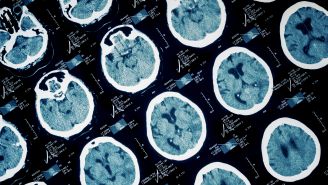Updated on September 27, 2023.
Millions of Americans are diagnosed with some form of dementia each year—and the numbers are only growing. During the COVID-19 pandemic in 2020, there were 303,984 deaths from dementia-related causes in the United States, according to the Centers for Disease Control and Prevention (CDC). By the year 2060, the CDC projects there will be 14 million U.S. adults with dementia.
Although the condition is common, questions about dementia persist. What causes it, how might it affect you, and where can you find help? Perhaps most importantly, can dementia be prevented?
Dementia defined
Dementia isn’t one disease; it’s a state of overall mental decline that can result from a number of conditions. Dementia involves two or more problems with thinking, such as memory loss and confusion beyond the occasional forgetfulness expected with aging. Its symptoms usually get worse over time, and many of the conditions that cause it cannot be reversed. Eventually, dementia may interfere with your ability to perform basic tasks and take care of yourself.
Causes of dementia
Numerous illnesses and injuries can cause dementia. The most common is Alzheimer’s disease, which involves nerve cell damage and the buildup of protein clumps in the brain, called “plaques” and “tangles.” Scientists believe these clumps keep your brain cells from communicating with each other, as well as with the rest of your body. That interferes with your ability to think clearly, remember things, and complete everyday activities.
Problems with blood vessels can also contribute to dementia. When blood and oxygen flow to the brain are limited by issues such as stroke or the buildup of cholesterol plaque, brain tissues can be damaged or destroyed. This is called vascular dementia.
Other causes of dementia include:
- Parkinson’s disease
- Head trauma
- Multiple sclerosis
- HIV
- Chronic alcohol or drug use
- Huntington’s disease
It’s also possible to have a mixed form of dementia, in which more than one condition contributes to your symptoms at the same time.
Dementia signs
Symptoms vary according to the underlying cause of your dementia, but may include:
- Memory loss
- Poor judgment
- Difficulty remembering words
- A hard time completing tasks with multiple steps
- Problems managing money
As your disease advances, you may experience hallucinations, delusions, or trouble with daily activities like bathing and dressing. The later phases of dementia can involve the loss of certain bodily functions like walking, bowel and bladder control, facial expressions, and speech.
If you have a family history of dementia and risk factors like obesity, high cholesterol, or high blood pressure by middle age, let your healthcare provider (HCP) know so you can start screenings early.
Diagnosing dementia
Once symptoms appear, your HCP will begin monitoring your reasoning abilities and memory skills using a series of cognitive tests. Repeating those tests over time can help determine whether your symptoms are worsening. If symptoms stay the same, you may be experiencing normal brain changes related to aging. If symptoms get worse, your HCP will perform more tests to give you a diagnosis. These tests can include:
- A CT, PET, or MRI head scan, which can show changes in the brain
- A cerebrospinal fluid test, which can help identify Alzheimer’s disease
- Blood tests, which can reveal conditions that might be causing symptoms instead of dementia, like diabetes or a thyroid problem
- An electroencephalogram (EEG), which looks at brain activity
Treatment options
The type of dementia you have will determine which treatment you need. There’s no cure for most types of dementia, but non-medical treatments such as occupational therapy and cognitive rehabilitation may help you maintain your quality of life and remain independent for as long as possible.
Some conditions, such as Alzheimer’s disease and Parkinson’s disease, have medications available to help control their symptoms. There are also many clinical trials underway to investigate new treatments. Consider asking your HCP if a drug trial would be appropriate for you.
How to lower your dementia risk
A 2020 report published in the journal The Lancet suggests that up to 40 percent of dementia cases may be prevented or delayed if steps are taken during certain phases of your life to lower your risk. That’s because a significant proportion of diagnoses can be traced back to 12 risk factors you can actually do something about, including smoking, physical activity, alcohol consumption, obesity, and more.
In early life: Encourage children and teens to get as much education as possible. Even if people don’t graduate high school or seek higher education, reading daily and regularly challenging themselves to learn new concepts can encourage healthy thinking skills. Learning a foreign language or a musical instrument may help buffer against dementia over time or delay its onset, as well.
In mid-life: During this stage, Lancet researchers note that hearing loss, excess alcohol, traumatic brain injury, high blood pressure, and obesity raise your risk. To help reduce your odds, consider the following:
- Hearing loss during mid-life may raise your dementia risk. Protect your ears to help lower your chances and use hearing aids as recommended by your HCP.
- Track your blood pressure so you can get help promptly if it goes too high.
- Consider eating a Mediterranean-style diet to help lower blood pressure, improve cardiovascular health, and control your weight.
- Drinking alcohol is never risk-free in terms of your health. Moderation is key. Women should have no more than one drink daily, while men should limit themselves to two. And if you don’t drink, don’t start.
- Protect yourself from traumatic brain injuries by always using proper safety equipment and headgear and learning to recognize symptoms of a concussion.
In late life: Smoking, a lack of exercise, depression, loneliness, air pollution, and diabetes all put you at risk, according to the Lancet study. To help minimize your odds, keep these tips in mind.
- Learn how to tell if your bad mood is actually depression, so you can get the help you need.
- Counteract loneliness by volunteering or even performing small, random acts of kindness.
- Get help quitting tobacco by making an appointment with an HCP or trying proven ways to kick the habit.
- Find out about getting the best possible care for your diabetes.
No matter your age, you can benefit from building healthier habits now. You’ll help lower your dementia risk, but they can also improve your overall quality of life in the process.







